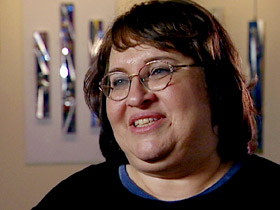In This Episode << SLIDE LEFT TO SEE ADDITIONAL SEGMENTS
Meditation
SHARON SALZBERG (Author and Meditation Teacher): A very, very common foundational exercise in meditation is to just sit down and feel your breath, just the normal, natural flow of the breath wherever it’s appearing, and most people are kind of shocked to discover it’s generally not like a thousand breaths before your mind wanders. It’s generally like two.
We practice letting go, we practice beginning again. No matter how long it has been, no matter where your attention went it’s okay. Just gather our attention back to feeling the breath.
 We all get distracted, and I think it’s important to realize that it’s normal, it’s natural, it’s not a sign of failure, it doesn’t mean you are doing badly, because I would say the critical moment in the meditation in that way is the moment we realize we’ve been distracted, and that is a moment where it is so common to just berate ourselves and condemn ourselves and carry on for a very long time, whereas we have this opportunity to just let go and to begin again. So beginning again is, I would say, the essence of the transformation of meditation.
We all get distracted, and I think it’s important to realize that it’s normal, it’s natural, it’s not a sign of failure, it doesn’t mean you are doing badly, because I would say the critical moment in the meditation in that way is the moment we realize we’ve been distracted, and that is a moment where it is so common to just berate ourselves and condemn ourselves and carry on for a very long time, whereas we have this opportunity to just let go and to begin again. So beginning again is, I would say, the essence of the transformation of meditation.
So many times people in Manhattan will say to me, it’s fine for the Buddha sitting under a tree 2500 years ago in India. It’s too bad that I live in Manhattan where it’s too noisy. But if you do live in Manhattan you have to work to make it real right there.
Meditation has been cradled in many, many religious traditions. It’s really about the method. It’s not about a belief system, it’s not about a dogma. It’s about personally utilizing a method to see what benefits you might get.
I come from a family with a great deal of suffering and loss and conflict, and like for many people it was a family system where this was never ever spoken about, so I didn’t know what to do with all of those feelings inside of me, and here was the Buddha saying you are not alone, this is part of life. And the other thing was his completely open invitation to do something about that suffering—not of course the suffering that comes our way through loss and circumstance, but the way we hold it. There are very practical, pragmatic methods that anyone can utilize to transform their own minds.
When we are lost in anger that’s very painful, and greed and fear and jealousy—these are extremely painful states, and if we can make that transition to reframing it we can have some compassion for ourselves, and that’s a good beginning.
So maybe you are at that contentious meeting at work and energy is starting to rise and tempers are starting to go up. You don’t have to say, oh, excuse me for a minute and like go and open a closet door and pull out all your equipment and do the set-up and, you know, light the candle—sorry, Buddha. You don’t even have to close your eyes. No one needs to know you are doing it. Isn’t it amazing that we can have that kind of resourcefulness? We tune in, we connect, we come back.

